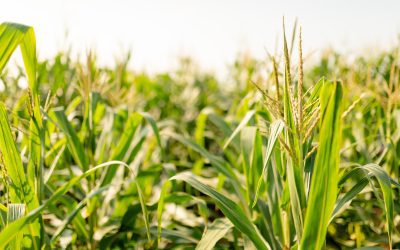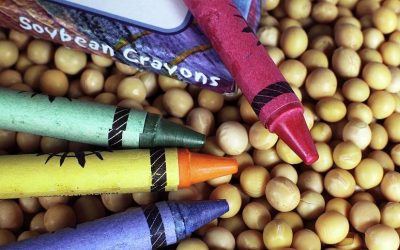BY ANN HINCH
Taking a break one morning from winterizing a hog barn to talk about his recent election to the Indiana House of Representatives, Kendell Culp recounted something he learned that week at new-legislator orientation in Indianapolis. “Most legislation that gets passed is passed in a bipartisan manner,” the Jasper County farmer said, “but we don’t often hear about that.”
In May, Culp won a plurality of votes in the State District 16 Republican primary against two challengers, which effectively propelled him to the Indiana Statehouse since there was no Democratic candidate on the General Election ballot.
Culp’s new seat is notable for other reasons this year. Statehouse districts were redrawn after the 2020 census to take effect this Nov. 8. The new map amended District 16’s borders to exclude Newton and Fulton counties but to keep Jasper, Pulaski and Starke, and to draw in White County, which was part of then-neighboring District 25. (District 25 is now near Indianapolis). On the heels of the new map in September 2021, Reps. Doug Gutwein and Don Lehe – the Republicans representing districts 16 and 25 respectively – announced they would not seek re-election.
Culp said he knew a couple years ago Gutwein was retiring, which is what started him thinking about campaigning for that seat. At the time, Lehe was the only full-time farmer serving in the Indiana House and with redistricting looming, Culp was concerned that higher urban and suburban populations meant there would be less representation of rural interests in state laws.
After talking it over with family and colleagues on the Indiana Farm Bureau (INFB) – of which he has been vice president since 2016 – he decided to throw his hat in the ring. While making his decision, he didn’t know Lehe was
also retiring. So, while he was hoping to add a second full-time farmer to the General Assembly, his election has at
least kept the tally at one.
“To help agriculture and to help our rural communities bring some commonsense decision-making to the Statehouse – I think that’s always a good thing to have,” he said, noting there are other legislators who farm part-time or are ag-friendly but none he knows who farm full-time.
Guide where the dollars go
Culp, 61, has something of a genetic predisposition to public office as well as decades of appointed and elected positions behind his name – including serving on the Indiana Soybean Alliance (ISA) board as a director from 2013 to 2022.
His parents were involved in party politics, which held no interest for young Culp; he was, however, inspired by the specific work his dad was able to do on the county council and commission.
Though he was born into farming as the fourth generation, Culp spent money to rent farmland for the first time as a high-school junior. The older generations had cattle, but he wanted to get into hogs, so in 1978 his dad helped him buy 30 bred gilts to keep in an old farrowing barn on the farm. “It was kind of the old-fashioned way,” he explained. “You let them out twice a day, inside they had a solid floor – lots of manual labor with that.”
His father’s promise was if the boy stuck with the work, he would help his son expand the swine operation on-farm. “I guess I stayed with it,” quipped Culp, who now owns the 4,500-hog, farrow-to-finish operation with his wife, Tammy, and their son, Brandon. Their daughter, Kayla, farms primarily with her husband’s family but helps as needed.
Three young grandchildren are the potential sixth generation of this family operation.
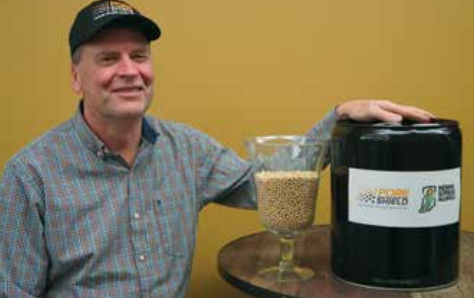
During his time on the ISA board, Culp was able to work on many innovative, soy-based products such as PoreShield, a concrete durability enhancer.
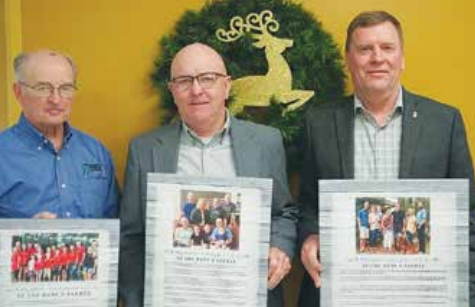
After nine years of service, Culp termed off of the ISA board in 2021. Also leaving the board that year were Rensselaer, Ind., farmer David Rodibaugh, far left, and Kimmel, Ind., farmer Larry Wilkinson.
Along with Culp’s parents, Kendell, Tammy and Brandon also grow corn, soybeans and wheat and finish 150 beef cattle on the farm. In addition, Tammy has a catering business and directs the sale of beef and pork from the farm at the farmers’ market, as well as supplies meat to a few grocery stores and restaurants.
Culp learned from his father that serving in local office meant having some control over local spending. “You could see you paid local taxes, property taxes,” he said, “and Dad always said you could see where those dollars were spent.”
In the 1980s, he was elected to the Barkley Township advisory board and served for nine years. There he decided, “If you really want to affect things on your tax bill, you need to be involved with your school.” The township
trustee appointed him to the school board, where he served eight years – three as its president.
There, Culp learned much about taxation and dealing with people. He recalled leading the district’s talks with educators during a teacher strike and negotiating a contract for the first time. “Everybody seemed to be happy with that, (and) I took that seriously,” he noted.
In 2004, he was elected to county commission, where he served 18 years until by law he had to resign in the middle of his fifth term – shortly after being elected to the Statehouse. “(County commissioner is) a bigger job than most people realize,” Culp mused, saying he never missed a meeting. “I’m proud of that, which hopefully shows my dedication to responsibilities that I take on.”
Jasper County is No. 1 in Indiana for overall ag production, as well as for corn and dairy. “Agriculture policy is a passion of mine,” and it pushed him to the state seat. “To me, (county commissioner) wasn’t a job, it was a passion. When you look at it that way, it’s enjoyable.”
He wants to see more economic development that enables Hoosier farmers to add in-state finished value to
the cornucopia of raw commodities they produce.
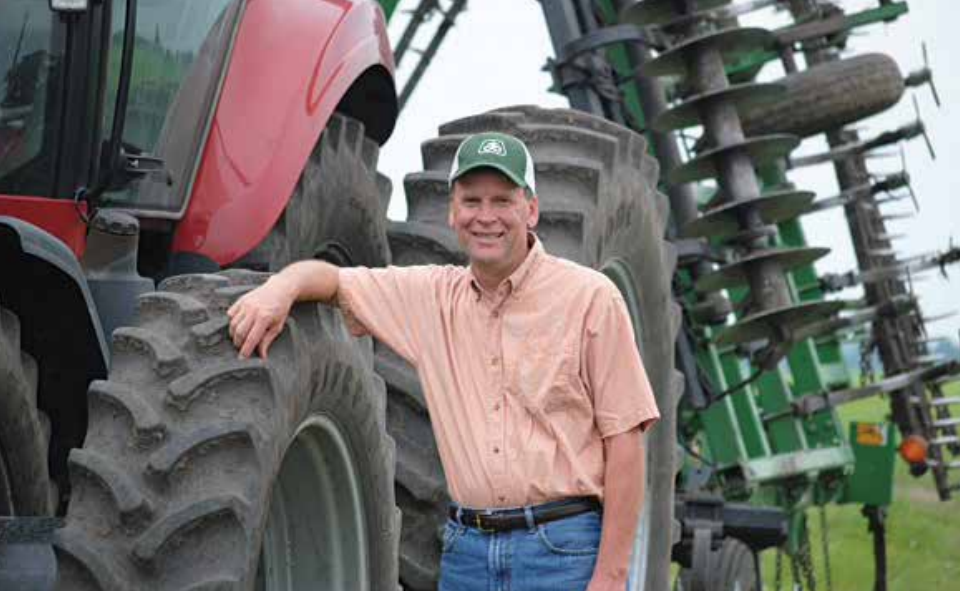
Though he was born into farming as the fourth generation, Culp spent money to rent farmland for the first time as a high-school junior. The older generations had cattle, but he wanted to get into hogs, so in 1978 his dad helped him buy 30 bred gilts to keep in an old farrowing barn on the farm.
A broader view of ag
He is also serious about incentivizing more producers to stay on the farm to ensure food security. Too many regulations, he said, can be a roadblock to that desire to farm. “We’re a pretty low-regulation state, and I want to keep it that way,” Culp explained.
Keeping new regulation at bay is just part of the formula; making existing regulations more friendly is also key to him. In 2017, Culp said the state legislature repealed the sales tax on drainage tile. While he acknowledged this did reduce immediate tax revenue, he figured it will be more lucrative for the state over time because improved drainage makes farm fields more productive.
“In essence, you are going to be producing more crops on that ground,” he said – which means more income tax revenue from higher sales.
Another area of agriculture for which he hopes to be a strong voice is energy production. He believes District 16 is home to the most different types of energy production in Indiana; there is infrastructure for wind and solar, battery storage, large dairies equipped with digesters converting methane to natural gas and a corn ethanol plant, in addition to more traditional means such as coal-fired generation, gas-fired and hydropower.
“There’s just a lot of diversity of energy here,” Culp said. “The buzz phrase (for agriculture) is ‘food, fiber and fuel’ … ‘fuel’ needs to be replaced with ‘energy. That can be highly controversial, but let’s face it, it’s here, so we need to deal with it.”
For example, one sensibility he can bring to discussions about energy production in the Statehouse is to point out it matters where wind turbines or solar panels are located. These are often erected on leased farmland, but at least in Jasper County he said there’s a thoughtfulness to how it has been done. The most productive soil is in the southern and eastern parts of the county, and turbines are mostly located in other parts of the county on sandier ground.
“I’m not sure every community looks at it that way, but you need to balance it that way to preserve fertile land,” he added.
Culp said his time on the ISA – which also led him to serving on the American Soybean Association’s board of directors since 2015 – opened his eyes to a broader view of the impact of farming. He learned more about new uses for soybeans and corn, marketing opportunities and overseas destinations for the crop. It took him from being narrowly focused on his own farm.
“As farmers, we don’t think of that – we do our job, we do our best to grow our crop or raise our livestock, we take care of our land or our animals and once that commodity’s sold, we start over again,” he said. “But that’s just the beginning…basically, it opened my eyes to a greater vision, a bigger picture of the enormity of our agricultural industry.
It also educated him on transportation infrastructure issues. In 2017 he said he testified on behalf of INFB and ISA Membership and Policy/Indiana Corn Growers Association at the Statehouse in favor of increased funding for roads and bridges through the state Community Crossings Matching Grant program. Though he is fiscally conservative, he thought this increase was justified.
One practical effort he is proud to have assisted with was a local ordinance in the 1990s when he was on the Jasper County Farm Bureau Board. Non-farmers were moving in from northern counties and more subdivisions were being built. The local board and lawmakers saw the potential for conflict between new residents who didn’t know about the noises and odors and loud late-night harvests of farming, and longtime farmers potentially expected to change their work.
Culp recalled he and others asking: “How do we live in harmony but yet respect each other that there’s times (farmers are) busy, so we don’t have to change the way we farm?”
County lawmakers passed an ordinance requiring those moving into the farm-adjacent subdivisions to attach a rider to the deeds waiving any landowner’s right into perpetuity to claim the preexisting farms as a “nuisance.” Since there was interest at the state level for such protections, he was part of the contingent who spoke with legislators as well – and a version of this went into Indiana’s “Right to Farm” law.
During this effort, he recalled working with an older man on the farm board who was a Democrat. When they were planning to speak with legislators, he told Culp: You work your side of the aisle and I’ll work mine, and we’ll get it done. “I’ve never forgotten that,” he explained.
“My grandfather always said about farming, you may own title to it, but you’re just caring for it for a lifetime, and you need to leave things better than you found them… When I’m done (as a lawmaker), hopefully I can look back and say, ‘Yep; things are better than when we started.’”
Rep. Kendell Culp and other state legislators were sworn into office Nov. 22, and the 2023 General Assembly is scheduled to begin its work on Jan. 9.
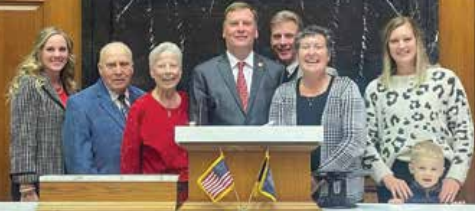
State Rep. Kendell Culp (R-Rensselaer, Ind.) poses with four generations of his family at the Indiana Statehouse. Culp was elected to District 16 of the Indiana House of Representatives on Nov. 8.


